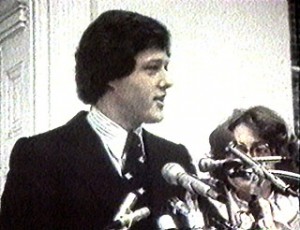 It was during the Democratic National Convention in September that I saw Bill Clinton work his magic. He stole the show from President Obama that night; I’ve never seen a speaker connect with an audience like that. For many my age, I think it was the first time we’d seen him demonstrate his political skill as adults. Impressed as I was, I wanted to learn more. So I picked up his biography by David Maraniss. It covers Clinton’s life from his birth until the day he announces his candidacy for President. The book was superb, and I’d highly recommend it. Here are themes that stood out to me.
It was during the Democratic National Convention in September that I saw Bill Clinton work his magic. He stole the show from President Obama that night; I’ve never seen a speaker connect with an audience like that. For many my age, I think it was the first time we’d seen him demonstrate his political skill as adults. Impressed as I was, I wanted to learn more. So I picked up his biography by David Maraniss. It covers Clinton’s life from his birth until the day he announces his candidacy for President. The book was superb, and I’d highly recommend it. Here are themes that stood out to me.
Personability
Bill Clinton was an extrovert. I mean extrovert in the sense that he thrived on interaction with others; it’s what gave him life. Where other politicians grew weary during long campaigns on the road, Clinton couldn’t get enough. Again and again one of Clinton’s acquaintances from his campaigns would confess to the power of his presence, that he was able to make people feel like they’d been friends forever. This was one of his great gifts, and one that he used to his political advantage. Clinton maintained extensive card files on everyone he met during his campaigns. Over the course of his political career, this catalogue grew to include addresses, phone numbers, dates of last contact, donation amounts, and other facts for thousands of people. It was both a compulsion and a calculated political move.
Curiosity about the people around him was one of his strongest traits, the main intersection of his gregarious, empathetic personality and his political ambition.
Purpose
Clinton knew that politics was his calling. From high school on, every decision he made was calculated to maximize his long term political viability. In this respect, he was often calculating and hollow; a friend today might be sacrificed tomorrow if necessary. The sense of purpose he demonstrated is exceptionally rare, I think. Most of us take longer to figure out what we’re called to do, if we ever do. It’s a fascinating thing to observe nonetheless–someone consumed with a single purpose.
Political skill
Time and again Clinton exhibited a masterful ability to negotiate difficult political scenarios. The most telling example of this was his navigation of the draft. Clinton received his draft notice towards the end of his first year at Oxford, where he was studying as a Rhodes Scholar. He was adamantly against the war, but he always maintained a moderate disposition towards the anti-war movement. Despite his convictions against the war, Clinton fundamentally believed in the system.
But his friends knew that he had invested too much time, hope, and ambition in his political future to abandon it by resisting. “Maintaining viability within the system was very important to him. Right from the start we all took his aspirations with real proper seriousness,”
He always believed that his best work would be from within the system, not from without. His actions to avoid the draft, therefore, remained in line with his calling to lead a political life and lead from within the existing system.
There’s something our generation can learn from this. So many of us are fed up with the political system as it is, and justifiably so. We turn to business, or non-profits, or NGOs as we seek ways to make a difference. In doing so, we leave a broken system unattended. If the best among us abandon government, who then will lead?
Conflict
Above all, Clinton was a conflicted person. His life seemed full of contradictions. Maraniss puts it best:
Then and always, these contradictions co-existed in Clinton—considerate and calculating, easygoing and ambitious, mediator and predator.
We have to consider Clinton in the context of his great ambition, his incredible political skill, and his very human weaknesses. I think he recognized early where he wanted to go and where his skills might best be used. After reading this book, I have little doubt that his intention to become President was rooted in a desire to do something good when he got there. I’m inclined to respect that.
In a particularly memorable speech at the 1980 DNC, Clinton warned that the political and economic systems of his day were breaking down:
We have seen high inflation, high unemployment, large government deficits, the loss of our competitive edge. In response to these developments, a dangerous and growing number of people are simply opting out of our system. Another dangerous and growing number are opting for special interest and single interest group politics, which threatens to take every last drop of blood out of our political system.
Inflation notwithstanding, that sounds awfully familiar, doesn’t it.
